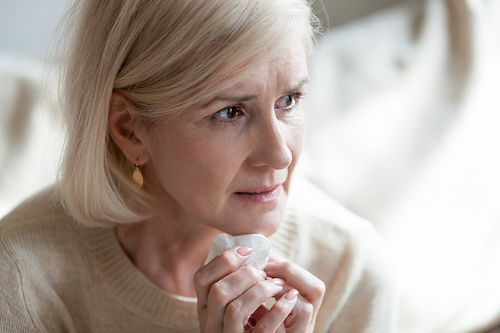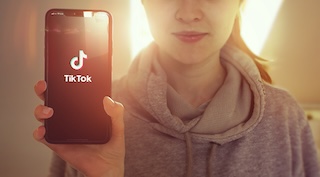February 28, 2025
by Elizabeth Pratt

There have been two mid air collisions and 94 aviation incidents so far in 2025. A passenger jet colliding with a helicopter in Washington DC and a Delta plane flipping at Toronto airport are just some of the aviation disasters making headlines.
Experts say the news could be troubling for those with flight anxiety, but there are strategies that can help.
[More]
September 17, 2024
by Patricia Tomasi

A new study published in PLOS ONE looked at the impact of pro-ana TikTok content on body image dissatisfaction and internalization of societal beauty standards. “The relationship between body image dissatisfaction, disordered eating behaviours and social media platforms, such as Instagram and Twitter, has been well documented,” study author Madison R. Blackburn told us. “The unique TikTok algorithm is more influential than the choices of individual users in determining the content they see on their ‘For You’ page.”
[More]
January 29, 2023
by Elizabeth Pratt

Daily engagement in political news can have a negative impact on mental health, but disengaging can also have consequences.
Research published in the Journal of Personality and Social Psychology found that strategies to manage the negative emotions that come from daily engagement may also reduce an individual’s motivation to act on what they care about politically.
[More]
November 5, 2021
by Tina Arnoldi

Social media has opened up new ways for us to interact and share our experiences with others. It lets us connect with people around the world and keep up with people through their posts, pictures, and memories. However, it can also be overwhelming when we experience low response rates from those we thought would like our posts. Not getting any likes on our posts can feel like rejection, which makes us feel unappreciated and ignored.
[More]
September 17, 2021
by Tina Arnoldi

There’s a new animated series (My Life is Worth Living) that hopes to prevent suicide through its story telling. They want to show how important human connection is for prevention. But can such a serious subject be addressed through a cartoon?
[More]
June 24, 2021
by Elizabeth Pratt

As the world grapples to come to terms with the impact of the COVID-19 pandemic, rates of mask wearing across the United States and around the world is highly variable.
Now a study from MIT has found that a public feeling of “collectivism” predicts whether or not mask use is common.
[More]
December 11, 2020
by Tina Arnoldi

In an earlier post for Theravive, I examined how cartoons and comics might be a useful way to educate people on mental health concerns. This fall, I interviewed Cara Bean to learn about the process behind Vermont’s Center for Cartoon Studies released “Let’s Talk About It: A Graphic Guide To Mental Health” about its use for education. Recently, there was an article in the Open Library of Humanities about the perceived value in using comics to teach mental health professionals.
[More]
December 4, 2020
by Tina Arnoldi

In a recent study, researchers surveyed 200 movies released between 1977 and 2019 with content about mental illness and found box office returns were higher than average. Those same movies received 15% of Oscar nominations during the time period. While the article still needs peer-review, the findings show that we, as a society, are doing a better job of talking about mental health.
[More]
October 29, 2020
by Elizabeth Pratt

Gen Z are experiencing increased stress levels due to uncertainties in their future.
The American Psychological Association’s annual Stress in America Report for 2020 found that Gen Z adults aged 18-23 reported the highest stress levels in the month prior at an average of 6.1 out of 10.
[More]
February 28, 2020
by Tina Arnoldi

We're in a volatile political climate in the United States and are heading into what will be an interesting election. Whether it’s a twitter storm or fake news, there’s plenty of ammunition for social media fights over political beliefs. And recent research found that general social media use has a negative effect on political knowledge, which may only fuel the fire in upcoming months.
[More]